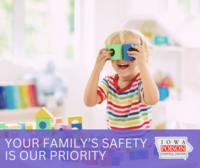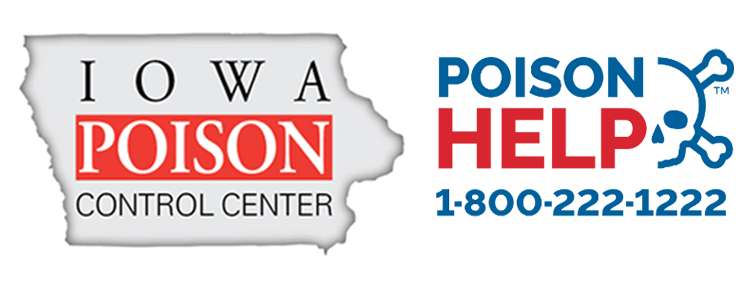
For Poisoning Questions or Emergencies, Call the Poison Experts at 1-800-222-1222
Toy Safety and the Hidden Poison Dangers: Protecting Our Children

Toys have been an integral part of childhood for generations, bringing joy and fostering creativity in the lives of young ones. However, amid the vibrant colors, imaginative designs and innocent play, there lies a hidden danger - the risk of poisoning. Poisonous substances in toys can pose a grave threat to the well-being of our children. In this blog post, we'll explore the importance of toy safety and the poison dangers associated with toys. We'll also highlight the crucial role of certified poison specialists at the Iowa Poison Control Center, who are available 24/7 to answer questions and provide guidance.
The Alarming Reality of Poisonous Toys
Toys are meant to be safe, yet every year, numerous children are exposed to harmful chemicals and toxins through their playthings. While strict regulations are in place to ensure toy safety, there are still instances of toxic substances ending up in the hands of unsuspecting children. Here are some of the common poison dangers associated with toys:
- Battery-Operated Toys: Batteries, particularly button cell batteries, can be found in various electronic toys. Swallowing a button cell battery can lead to severe injuries or chemical burns. If you suspect a battery has been swallowed by an adult or a child, please contact IPCC immediately at 1-800-222-1222.
- Magnets: Magnets present in toys are a major concern when swallowed. This is especially critical when more than one magnet or a magnet and a metallic object are ingested. These objects can attract each other within the digestive tract, potentially causing serious injuries by pinching or perforating the intestinal tissues. If multiple magnets are swallowed, immediate medical attention should be sought.
- Small Parts: Toys with small parts, such as marbles, beads or detachable components, can pose choking hazards, especially to infants and toddlers. Swallowing such small pieces can lead to choking and even more severe issues if the object becomes lodged in the airway.
- Lead-Based Paint: One of the most well-known dangers in toys is lead-based paint. Even though lead-based paint has been banned in toys in many countries, older toys, hand-me-downs or imported items may still contain this hazardous substance. Lead exposure can lead to severe health issues, including developmental delays, learning disabilities and behavioral problems.
- Art Supplies: Artistic and craft toys often come with materials like markers, paints and glues that may contain harmful chemicals. Ingesting or inhaling these substances can lead to poisoning.
- Allergens: Some children may have allergies to certain materials used in toys, such as latex or certain types of plastic. These allergens can cause skin irritation or respiratory problems.
The Role of the Iowa Poison Control Center
Ensuring the safety of toys is an ongoing effort, but accidents can still happen. That's where the Iowa Poison Control Center steps in as a lifeline for concerned parents and caregivers. The center's poison specialists are available 24/7 to provide immediate assistance and guidance, particularly in cases involving potential toy-related poisonings.
These specialists comprised of nurses, pharmacists and doctors are specifically trained in toxicology and can quickly assess the situation, provide first-aid instructions and offer recommendations for further medical care if necessary. They can also help identify the substances involved and their potential toxicity, which is crucial for the child's treatment.
Preventing Toy-Related Poison Incidents
The best way to protect children from toy-related poison incidents is through prevention. Here are some steps that parents, caregivers, and guardians can take to ensure toy safety:
- Read Labels: Pay close attention to the labels on toys. Look for age-appropriate warnings and guidelines. Ensure that toys are suitable for the child's age and developmental stage.
- Purchase from Reputable Retailers: Buy toys from well-known, reputable retailers and manufacturers. These companies are more likely to adhere to safety regulations and standards.
- Inspect Toys Regularly: Examine toys for wear and tear, loose parts or damaged pieces. Dispose of broken or compromised toys immediately.
- Keep Small Parts Away: Store toys with small parts out of reach of young children to prevent choking hazards. Consider using small parts testers to ensure safety.
- Check for Recalls: Stay informed about toy recalls by regularly checking the Consumer Product Safety Commission (CPSC) website and other reliable sources.
- Be Cautious with Hand-Me-Downs: Exercise caution when giving or receiving hand-me-down toys, especially if they are older and may not meet current safety standards.
- Educate Children: Teach children about the importance of not putting toys in their mouths and the potential dangers of doing so.
- Store Batteries Safely: Keep spare batteries and battery-operated objects out of children's reach. Always check if battery compartments, in toys and other household items, are securely fastened to prevent children from accessing the batteries. Awareness of battery security in all objects, not just toys, is essential for child safety.
- Monitor Art Supplies: Supervise children when using art supplies and ensure they use them in a well-ventilated area. Keep harmful materials out of reach.
Toys play a crucial role in a child's development and happiness, but it's essential to be aware of the potential poison dangers they may pose. By staying informed and following safety guidelines, we can minimize the risks associated with toys. Remember, the Iowa Poison Control Center's poison specialists are available around the clock to provide support and advice in case of emergencies. Let's work together to keep our children safe, happy and healthy during their playtime adventures.
